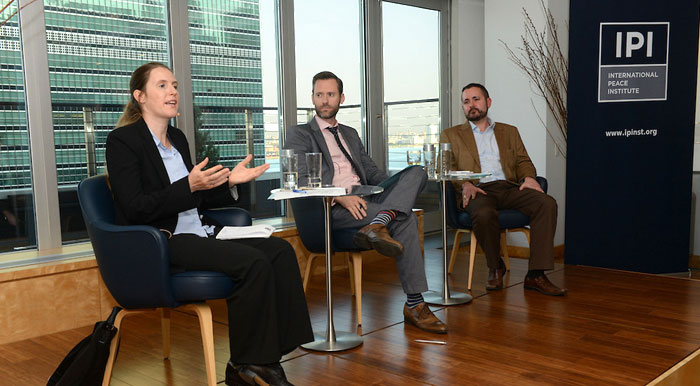
Authors Séverine Autesserre and Philip Cunliffe told an IPI audience that the recent challenges and setbacks of peacekeeping operations are creating opportunities for looking at peacekeeping in a critical, outside-the-box way.
Speaking at a “Critical Conversations on Peacekeeping and Peacebuilding” event on June 2nd, the two authors laid out new approaches to peacekeeping, when it comes to both on-the-ground practice and the larger picture of UN peacekeeping.
Reflecting an argument she makes in her new book Peaceland, Ms. Autesserre said that peacebuilders don’t have the knowledge of local habits, culture, and other important factors that would help them connect with local populations. This, she said, leads to a lack of communication between international forces and locals, creating a problem that can damage the effectiveness of UN peacekeeping as a whole.
“Although local ownership is essential in peacebuilding, local actors are rarely included in this process,” she said. “The consequence is that the valuable knowledge of local people is often trivialized.”
International peacekeepers often come from countries with different customs and environments and therefore lack the type of knowledge that could help them connect with local people, she said. This in turn leads to a tendency for forces to isolate themselves, creating what she called the “bunkerization” of UN peacekeepers.
Ms. Autesserre, who teaches Political Science at Barnard College of Columbia University, acknowledged that “bunkerization” also happens because peacekeepers perceive their missions as being particularly dangerous. But whether it is a result of danger or incomprehension, it is a problem that needs a solution, she said.
“International forces should take the time to listen to local people, their concerns, and their needs,” she said.
Mr. Cunliffe, the author of Legions of Peace: UN Peacekeepers from the Global South, said that regardless of what peacekeepers do on the ground, the system itself is flawed because it is based on a “liberal imperialistic” order that particularly exploits and burdens developing nations.
“Current peacekeeping practice is one where Western countries provide funds for missions, but it is developing nations that provide the troops,” he said. And as he explains in his book, this arrangement, widely accepted within the UN system, puts an uneven burden on poorer states. “It is a system that is in no way different from earlier forms of liberal empire,” he said, where colonizing powers sought to “civilize” the Third World.
“So, seeing the peacekeeping bargain between wealthy and poorer nations as a simple trade-off is quite naïve,” he said.
Mr. Cunliffe, who is a faculty member at the University of Kent in the UK, said the trade-off involves a more serious cost. Because of the “civilizing” perception of missions, he said, the UN can justify military action as a first option and can keep it in place too long.
“Peacekeeping missions are now the reflex military option for the international community,” he said, indicating that this immediate reliance on peacekeepers is not necessarily a positive thing.
“Also, the deployment of peacekeepers for too long can have serious consequences,” he said, “one of which is the blurring of lines between war and peace.” Eventually, both locals and peacekeepers forget why forces were deployed in the first place, all the while maintaining a military presence on the ground, he said.
The two authors offered different recommendations for future action. Ms. Autesserre said that one way to bridge the gap between international forces and local populations would be for the UN community to rely more on local staff for the fulfillment of some functions associated with both peacekeeping and peacebuilding.
Mr. Cunliffe said that the recurrent use of military power by the UN has important political costs which should be acknowledged by both the UN and the rest of the international community.
Adam Smith, IPI Senior Fellow and Head of IPI’s Center for Peace Operations, moderated the discussion.







